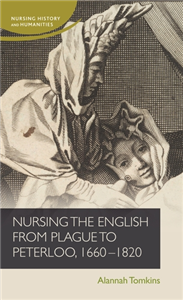Nursing the English from plague to Peterloo, 1665-1820
by Alannah Tomkins
Description
More Information
Rights Information
Albania, Algeria, Angola, Argentina, Armenia, Australia, Austria, Bahrain, Belgium, Belize, Benin, Bolivia, Bosnia and Herzegovina, Botswana, Brazil, Bulgaria, Burkina Faso, Burundi, Cameroon, Canada, Cape Verde, Central African Republic, Chad, Chile, China, Colombia, Comoros, Congo [DRC], Congo, Republic of the, Costa Rica, Ivory Coast, Croatia, Czech Republic, Denmark, Djibouti, Ecuador, Egypt, El Salvador, Equatorial Guinea, Eritrea, Estonia, Ethiopia, Faroe Islands, Finland, France, French Guiana, Gabon, Gambia, Georgia, Germany, Ghana, Greece, Guatemala, Guinea, Guinea-Bissau, Guyana, Honduras, Hongkong, Hungary, Iceland, India, Indonesia, Iran, Iraq, Ireland, Israel, Italy, Japan, Jordan, Kazakhstan, Kenya, Kuwait, Latvia, Lebanon, Lesotho, Liberia, Libya, Lithuania, Luxembourg, Macau, China, Macedonia [FYROM], Madagascar, Malawi, Malaysia, Mali, Malta, Mauritania, Mauritius, Mayotte, Mexico, Mongolia, Montenegro, Morocco, Mozambique, Namibia, Netherlands, New Zealand, Nicaragua, Niger, Nigeria, Norway, Oman, Pakistan, Panama, Paraguay, Peru, Philippines, Poland, Portugal, Puerto Rico, Qatar, Reunion, Romania, Russia, Rwanda, Saint Helena, Sao Tome and Principe, Saudi Arabia, Senegal, Serbia, Seychelles, Sierra Leone, Singapore, Slovakia, Slovenia, Somalia, South Africa, South Korea, Spain, Sri Lanka, Sudan, Suriname, Swaziland, Sweden, Switzerland, Syria, Taiwan, Tanzania, Thailand, Timor-Leste, Togo, Tokelau, Tunisia, Turkey, Uganda, Ukraine, United Arab Emirates, United Kingdom, United States, Uruguay, Venezuela, Vietnam, Western Sahara, Yemen, Zambia, Zimbabwe, South Sudan, Cyprus, Palestine, Bangladesh, Cambodia, Liechtenstein, Azerbaijan, Jamaica, Kyrgyzstan, Dominican Republic, Myanmar, Monaco
Endorsements
Nursing the English analyses the reputations and experiences of women and men who nursed the sick in the period before any calls for nursing reform. It begins in 1660, since the separation of sick nursing from childcare nursing can be dated to the final third of the seventeenth century, and to include the final epidemic of plague. It concludes in 1820, the year of Florence Nightingale's birth. This was coincidentally the same year which saw the first European publication calling for the founding of a Protestant nursing sisterhood, a movement which eventually propelled the drive for nurse training. Chapters focus on domestic nursing by women, the long history of nursing at St Bartholomew's Hospital in London, the careers of women recruited to nurse in provincial infirmaries, and the lives of 'matrons' who nursed old soldiers at the Royal Hospital Chelsea. The final two chapters pull together the evidence for nursing by men, the conflicts with normative masculinity that lay in wait for male carers, and the plethora of intentional and ad hoc nursing by both women and men as a result of Britain's wars with France, 1793-1815. The purpose of this volume is to make a decisive statement in contradiction to the stereotype of the pre-reform nurse as ignorant, illiterate and drunk, to characterise her (and also him) as working well in context. Gender, status, and proximity to 'dirty work' are offered here as an essential framework for understanding the challenges of nursing before reform.
Reviews
Nursing the English analyses the reputations and experiences of women and men who nursed the sick in the period before any calls for nursing reform. It begins in 1660, since the separation of sick nursing from childcare nursing can be dated to the final third of the seventeenth century, and to include the final epidemic of plague. It concludes in 1820, the year of Florence Nightingale's birth. This was coincidentally the same year which saw the first European publication calling for the founding of a Protestant nursing sisterhood, a movement which eventually propelled the drive for nurse training. Chapters focus on domestic nursing by women, the long history of nursing at St Bartholomew's Hospital in London, the careers of women recruited to nurse in provincial infirmaries, and the lives of 'matrons' who nursed old soldiers at the Royal Hospital Chelsea. The final two chapters pull together the evidence for nursing by men, the conflicts with normative masculinity that lay in wait for male carers, and the plethora of intentional and ad hoc nursing by both women and men as a result of Britain's wars with France, 1793-1815. The purpose of this volume is to make a decisive statement in contradiction to the stereotype of the pre-reform nurse as ignorant, illiterate and drunk, to characterise her (and also him) as working well in context. Gender, status, and proximity to 'dirty work' are offered here as an essential framework for understanding the challenges of nursing before reform.
Author Biography
Alannah Tomkins is Lecturer in History at the University of Keele
Manchester University Press
Manchester University Press is a leading UK publisher known for excellent research in the humanities and social sciences.
View all titlesBibliographic Information
- Publisher Manchester University Press
- Publication Date January 2025
- Orginal LanguageEnglish
- ISBN/Identifier 9781526178527 / 1526178524
- Publication Country or regionUnited Kingdom
- FormatPrint PDF
- Pages344
- ReadershipGeneral/trade; College/higher education; Professional and scholarly
- Publish StatusPublished
- Dimensions216 X 138 mm
- Biblio NotesDerived from Proprietary 5967
- SeriesNursing History and Humanities
- Reference Code16397
Manchester University Press has chosen to review this offer before it proceeds.
You will receive an email update that will bring you back to complete the process.
You can also check the status in the My Offers area

Please wait while the payment is being prepared.
Do not close this window.



